
Annual Report 2024

Annual Report 2024
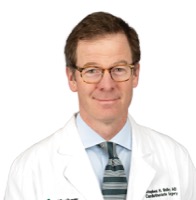
At the Allegheny Health Network (AHN) Cardiovascular Institute, we have a lot of exciting news to share with you in this, our Annual Report for 2023.
As chronicled in the following pages, the mitral valve program has once again been designated as a Mitral Valve Repair Reference Center by the American Heart Association™, highlighting superb outcomes utilizing advanced technologies in these complex procedures.
Meanwhile, interventional cardiologists at the institute are early adopters of novel approaches such as renal denervation for patients with refractory hypertension, coronary flow reserve for those with microvascular coronary artery disease and coronary brachytherapy for patients with coronary artery disease. We also offer an array of transcatheter therapies for patients with the most complicated forms of structural heart disease.
Our partnerships with the Mario Lemieux Foundation™ and Carnegie Mellon University have yielded the Mario Lemieux Innovation Fund in cardiac electrophysiology, bringing state-of-the-art treatments for arrhythmias to patients in the region.
Two recent clinical trials, for which the institute served as a participating site, have produced novel therapeutic regimens for patients with lipid disorders. In addition, our team of nuclear and preventive cardiologists is leading the way in the use of genetic testing designed to identify those at risk for these disorders.
These efforts are part of the institute’s initiative establishing cardiovascular disease prevention clinics at our locations throughout the region.
Finally, our team of vascular surgeons is using approaches such as transcarotid artery revascularization and technologies such as the intraoperative positioning system (IOPS)™ to achieve incredible outcomes in the management of severe vascular disease.
These and other achievements continue to highlight the commitment of our physicians and surgeons as well as the benefits of collaborative multidisciplinary care. I am also thrilled to announce that Akshay Khandelwal, MD, an interventional cardiologist, joined us as chair of the Department of Cardiovascular Medicine. In his new role, Dr. Khandelwal will partner with colleagues within the Cardiovascular Institute and the AHN Department of Thoracic and Cardiovascular Surgery to promote collaboration through all stages of the patient care journey.
We encourage you to refer patients to our specialists or contact us for a consultation. Either way, you will become part of a team working to optimize your patient’s health.
Sincerely,
The American Heart Association name is a registered trademark and is used with permission. The Mario Lemieux Foundation is trademarked and used with permission. IOPS is a trademark of Centerline Biomedical and is used with permission.
Vascular surgeons at AHN are incorporating transcarotid artery revascularization (TCAR) and intraoperative positioning system (IOPS™) technologies into clinical practice. With almost 450 cases to date, AHN is among the most high-volume TCAR providers in the region. The procedure allows surgeons to address carotid artery disease by placing a stent from an incision into the neck.
TCAR may be on track to supplant carotid endarterectomy and transfemoral carotid stenting for certain patients “because the results have been so great,” said Satish C. Muluk, MD, Director of the Division of Vascular Surgery at AHN.
“TCAR is better than transfemoral carotid stenting because we’re placing the stent from a location very close to the blockage,” he added. “It reduces the chance of complications and it theoretically could be better than traditional carotid endarterectomy because it’s a smaller operation. It’s also less complex; you don’t have to clamp the vessel and remove the plaque.”
AHN has been designated as a TCAR Center of Excellence by Silk Road Medical®, the company at the forefront of the procedure, for the high quality of care and positive outcomes.
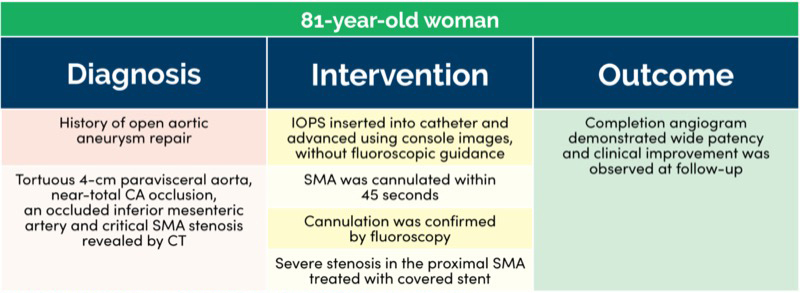
Meanwhile, IOPS™ enables a reduced exposure to radiation and contrast dye for patients undergoing endovascular procedures. Dr. Muluk and his team recently published data describing their initial experience with IOPS™ (Table).1 Of four consecutive patients with endovascular chronic mesenteric ischemia, IOPS™ successfully facilitated navigation of three of the patients’ anatomies.
“You can create a map of the patient’s blood vessels based on their CT scan, and then you superimpose that map on the patient’s image when they’re in the angiogram suite,” Dr. Muluk said. “You can navigate your wires and catheters using that map with special sensors on the wires and catheters. The technology still has some limitations, but it definitely has a lot of potential.”
Silk Road Medical® is a registered trademark and is used with permission.
IOPS™ is a trademark of Centerline Biomedical and is used with permission.
A new treatment approach, available through clinical trials at the AHN Cardiovascular Institute, is showing promise for patients with elevated lipoprotein (a), a genetic disorder that increases patients’ risk for stroke and heart attack.1 Two new injectable medications are being evaluated in clinical trials at AHN that harness antisense oligonucleotide technology to suppress the production of the protein.
Because many lipid disorders are the result of a combination of factors, the services available to patients at the Cardiovascular Institute are most effective when used in combination. Recognizing this, specialists at the institute work together to optimize patient care from multiple angles.
“We offer a multidisciplinary service that includes a nutritionist who’s focused on lipid disorders,” said Indu G. Poornima, MD, Director of the Section of Preventive Cardiology and Women’s Heart Center at AHN. “These patients have heart attacks at a very young age and, since this is a genetic condition, there’s nothing patients can do to lower the levels of lipoprotein (a), meaning lifestyle changes don’t work.”
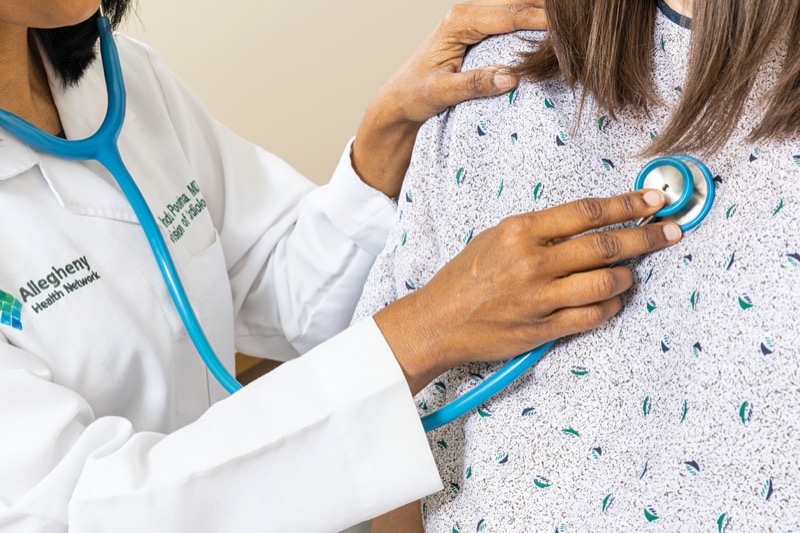
Genetic tools have also revolutionized lipid disorder care. Through precision medicine approaches, specialists at the Cardiovascular Institute identify patients with monogenic abnormalities and provide tailored treatment.
Lipidologists at the institute provide access to whole-genome screening to help inform the treatment of high cholesterol, not just for the patient but, through an approach called cascade screening, also for that patient’s family.
“As we identify those patients and as drugs are tested in these populations, we can offer a real patient-centered approach to the management of high cholesterol,” Dr. Poornima noted. “If you identify one individual with genetic hyperlipidemia, we can screen the rest of the family so that we can pick up things early. We are trying to offer the latest treatments and are using the best possible published evidence and staying on top of the research.”
A highly productive collaboration between AHN’s Cardiovascular Institute, Carnegie Mellon University and the Mario Lemieux Foundation™ is spearheading advancements in arrhythmia care.
For example, in a project led by Emerson Liu, MD, and Chaojing Duan, AHN researchers are using AI models to perform sophisticated interpretations of ECG data to gain insight into how to optimize patient care. Recently, the team developed a model to predict response to cardiac re-synchronization therapy for patients with heart failure.
“We are working on artificial intelligence algorithms to predict arrhythmias and responses to treatment,” said Amit J. Thosani, MD, Director of Cardiac Electrophysiology for AHN and Medical Operations Officer for the Cardiovascular Institute. “We found an incremental value that is predicted by information in specific ECG recordings that has traditionally not been used as a marker or predictor of response to therapy.”
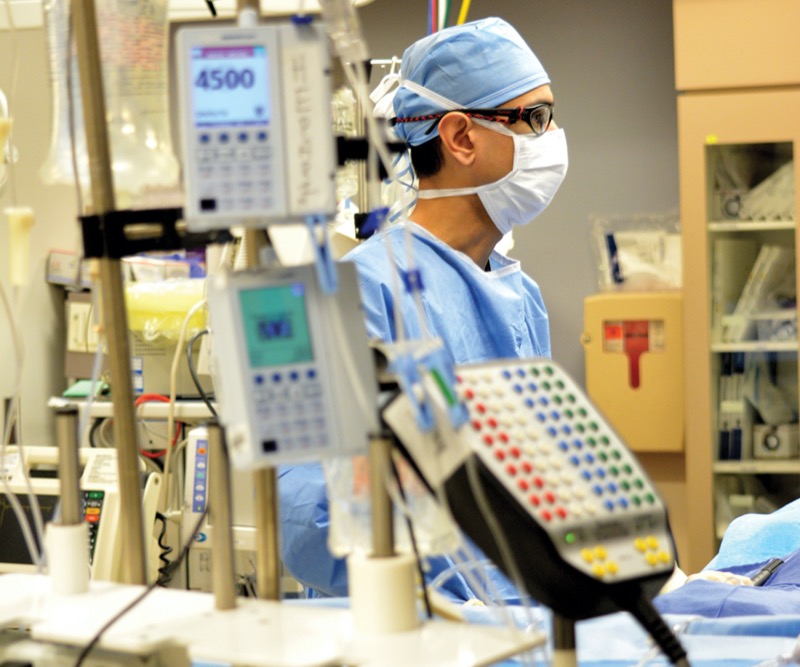
Meanwhile, for patients with ventricular arrhythmia, the Cardiovascular Institute offers noninvasive ablation therapy. AHN is also part of the Real Atrial Fibrillation Registry, a national, evidence-based collaborative for sharing best practices for atrial fibrillation care.
“We’ve been fortunate to have incredibly talented personnel, not just physicians, but nurses, nurse practitioners, physician assistants and lab techs,” Dr. Thosani said. “We feel a very deep responsibility to make sure that our community has access to world-class arrhythmia care, and we intend to continue to provide it.”
The Mario Lemieux Foundation™ is trademarked and used with permission.
The Interventional Cardiology program at AHN’s Cardiovascular Institute offers a vast range of treatment approaches for refractory hypertension, coronary artery disease and structural heart disease. For example, physicians at the institute are exploring a novel technique called “renal denervation” for patients with refractory hypertension.
“We’re able to enter the renal arteries and perform denervation,” said David M. Lasorda, DO, AHN’s Director of Interventional Cardiology. “We’re one of the first places in the region to be able to offer this procedure.”
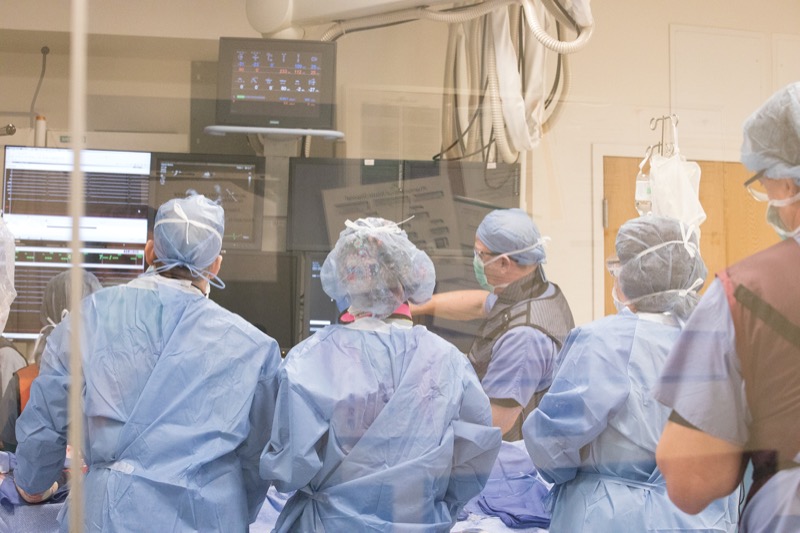
Physicians at the institute also offer a procedure called coronary flow reserve, which measures blood flow to the coronary arteries to provide a detailed assessment of a patient’s epicardial and microvascular physiology in the diagnosis of microvascular coronary artery disease. In addition, AHN remains the only center in the region to offer coronary brachytherapy for patients with coronary artery disease. “For complex patients who keep developing restenosis of their coronary arteries despite stenting, we’re the only one in the area offering intracoronary radiation, or brachytherapy,” said Dr. Lasorda.
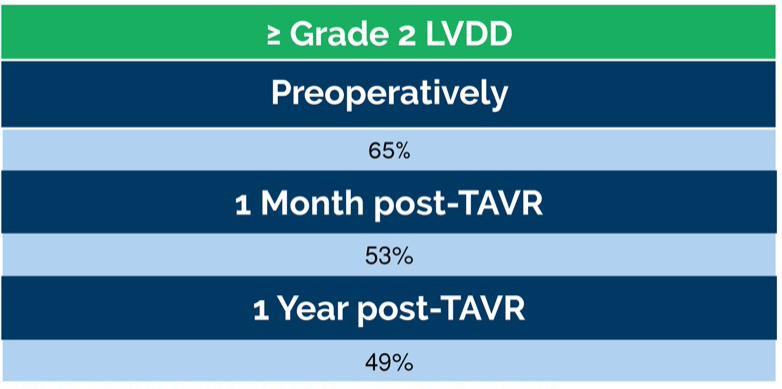
Interventional cardiologists at the institute are also proud to offer transcatheter aortic valve replacement for patients with the most complicated forms of structural heart disease. In a trial in which Dr. Lasorda was an investigator, the approach reduced left ventricular hypertrophy and diastolic dysfunction in patients with severe aortic stenosis (Table).1
“Cases that others don’t feel comfortable performing, that’s our area of focus,” Dr. Lasorda noted.
At the Cardiovascular Institute, surgeons are using new robotic techniques for minimally invasive mitral valve disease treatment. As a result, the mitral valve program at AHN has been designated as a Mitral Valve Repair Reference Center by the American Heart Association® (AHA) and the Mitral Foundation for multiple consecutive years, due to its outcomes with this approach.
“We remain one of the few programs in the country that runs a steady and successful robotic mitral repair program,” said Walter E. McGregor, MD, Director of AHN’s Cardiac Surgery Division. “The likelihood of valve repair in our hands is 95% or greater, and the survival rate is 99% or greater.”
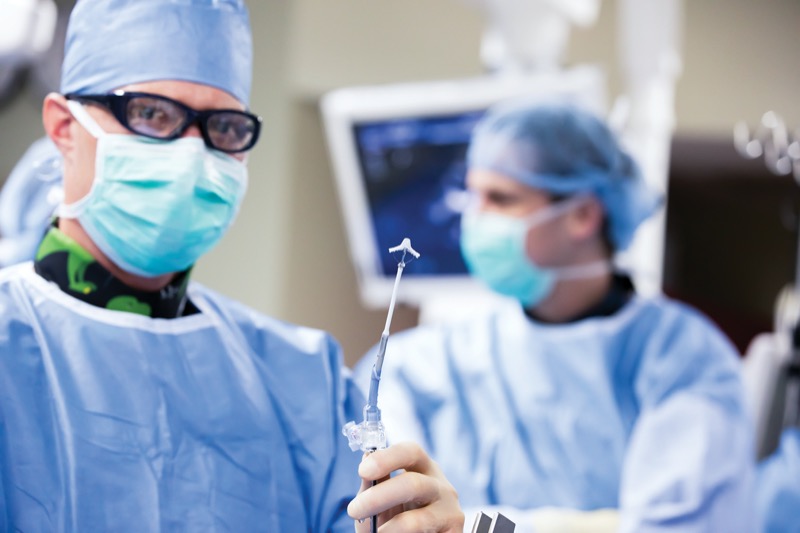
Recently, AHN surgeons incorporated the newest generation of the da Vinci Xi™, a sophisticated tool that enhances the surgeon’s technical capabilities to enhance patient outcomes and achieve very high repair rates. In addition, patients may undergo transcatheter mitral repair with MitraClip™, a technology that can restore disrupted blood flow.
“Through a needlestick in the groin and traversing a catheter across the right side to the left side of the heart, we can navigate the catheter and the clip down above the mitral valve, capturing both leaflets and pulling them together,” Dr. McGregor said. Physicians can also insert the SAPIEN™ M3 valve or the Tendyne™ valve using transcatheter technology.
“Both of these are beating heart technologies that don’t require the heart-lung machine,” Dr. McGregor said. “And some of them are only available through participation in clinical trials. We have a fair amount of experience with the investigational technologies, and we’ve had great success with them and a lot of happy patients who have regained their lives as a result.”
The American Heart Association® name is a registered trademark and is used with permission.
da Vinci™ is a trademark of Intuitive Surgical and is used with permission.
MitraClip™ is a trademark of Abbott and is used with permission.
Tendyne™ is a trademark of Abbott and is used with permission.
SAPIEN™ is a trademark of Edwards Lifesciences and is used with permission.
Copyright © 2024 All rights reserved.
McMahon Group unless otherwise noted.
Reproduction in whole or in part without permission is prohibited.
McMahon Custom Healthcare Marketing is part of McMahon Group.